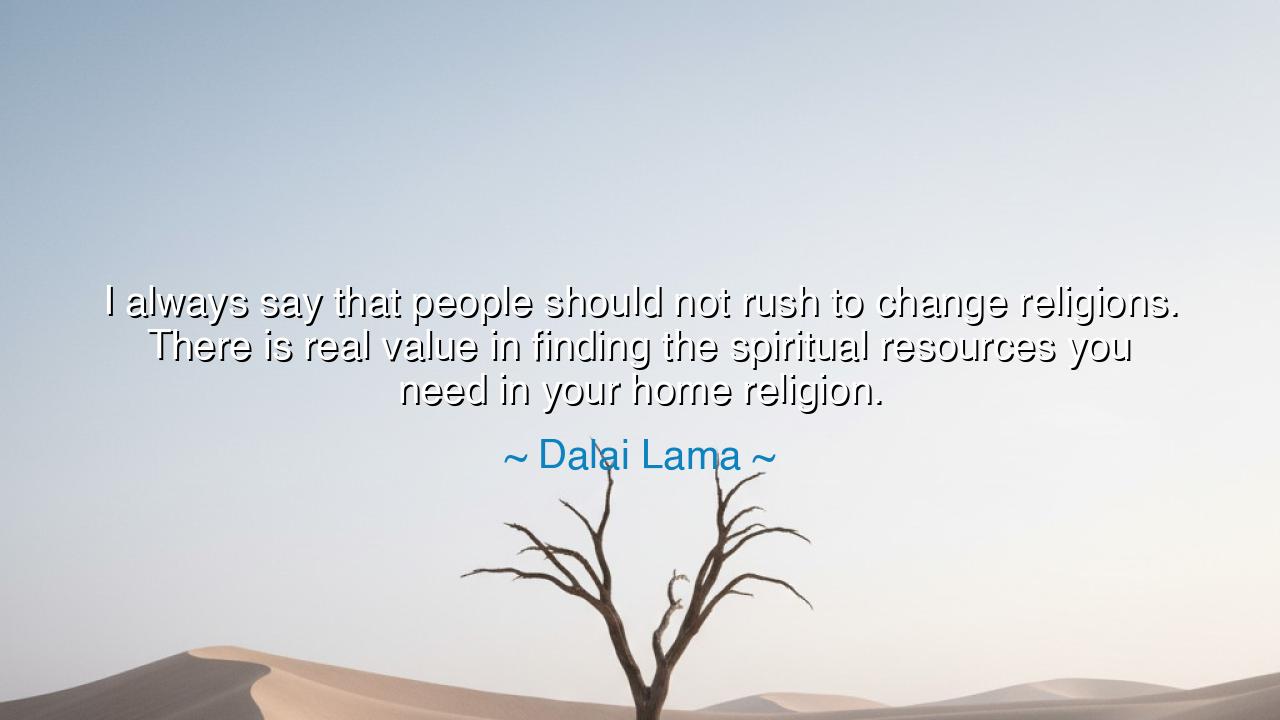
I always say that people should not rush to change religions.
I always say that people should not rush to change religions. There is real value in finding the spiritual resources you need in your home religion.






In the words of the Dalai Lama, “I always say that people should not rush to change religions. There is real value in finding the spiritual resources you need in your home religion.” — we hear the voice of profound wisdom, gentle yet unwavering. His words flow not from dogma, but from compassion — from a heart that has seen the world’s divisions and longs for harmony. Beneath their simplicity lies a truth as deep as time itself: that faith is not a garment to be exchanged, but a garden to be tended. The Dalai Lama, guardian of ancient Tibetan wisdom, speaks not to limit the soul, but to remind it that the sacred often dwells closest to home.
The meaning of his words lies in understanding that every faith, every path, holds within it the seeds of enlightenment. Too often, the restless spirit, weary or disillusioned, believes that peace lies elsewhere — in the distant temple, in the foreign creed, in the words of another tradition. Yet the Dalai Lama teaches that the divine is not bound to any one name or language. The truth that nourishes the heart can be found within the soil of one’s own tradition, if only one learns to dig deeply enough. Changing faith without understanding one’s own is like abandoning a garden before learning how to make it bloom.
The origin of this teaching lies in the Dalai Lama’s lifelong mission to unite rather than divide, to heal the fractures that dogmatic certainty has caused among humankind. He has walked the earth as both monk and exile, carrying within him the sorrows of displacement yet speaking always of compassion and continuity. Having encountered countless seekers from every faith — Christian, Muslim, Buddhist, Hindu, Jew, and skeptic alike — he has seen the same yearning in all hearts. His message emerges from that sacred observation: that the divine flame already burns in each tradition. It is not the change of religion that leads to truth, but the awakening of the inner spirit that sees the same light in all paths.
The ancients knew this well. Consider Emperor Ashoka, the great ruler of India, who in his youth was fierce in conquest but later turned to the way of peace through Buddhism. Yet, even as he embraced this path, he did not demand that others forsake their gods. Instead, he inscribed upon pillars across his land a message of tolerance: “One should honor the faith of others, for by doing so, one strengthens one’s own.” In this, Ashoka embodied the very spirit of the Dalai Lama’s wisdom — that spiritual depth comes not from fleeing one’s heritage, but from learning to honor all wisdoms through the refinement of one’s own.
To “find the spiritual resources in your home religion” is to return to your roots, to rediscover the living waters that may have long gone unnoticed. Every faith contains disciplines, prayers, stories, and virtues that, when understood, guide the soul toward clarity. Christianity teaches love and forgiveness; Islam teaches surrender and peace; Hinduism teaches unity of all existence; Buddhism teaches compassion and awareness. The Dalai Lama’s counsel is not against exploration, but against haste — the kind of spiritual wandering that mistakes novelty for truth. He reminds us that true transformation begins not by changing forms, but by deepening essence.
His teaching also calls for humility, a virtue often lost in the modern age of restless seeking. Many chase spiritual novelty as they chase pleasure — sampling, discarding, moving ever onward, yet never finding peace. But the wise know that every well yields water if one digs deeply enough. The Dalai Lama invites us to slow our pursuit, to listen again to the songs of our ancestors, to see the divine in the rituals we once took for granted. For when you rediscover the holiness in your own tradition, you honor not only your past, but also the universal spirit that lives in all.
Thus, the lesson of this quote is both gentle and eternal: seek depth before change, and understanding before judgment. Do not rush to exchange the faith of your childhood for the mystery of another, but rather, look more closely at the truths that have always been within your reach. Study your scriptures not with weary eyes, but with a fresh heart. Meditate on their meaning until their wisdom becomes alive again. And when you honor your own path, you will find it easier to honor the paths of others, for you will see that they all lead to the same mountain peak, seen from many sides.
And so, my children, remember this: faith is not a cloak to be traded for a finer one, but a flame to be tended until it burns clear and bright. Respect your home religion not out of duty, but out of gratitude — for it gave you the first language of the divine. Explore the world’s many paths, yes, but return always to your center. For only by knowing deeply where you stand can you truly see the beauty of all directions. As the Dalai Lama teaches, wisdom does not lie in running from your roots, but in letting them draw living water from the well of your own soul.






AAdministratorAdministrator
Welcome, honored guests. Please leave a comment, we will respond soon